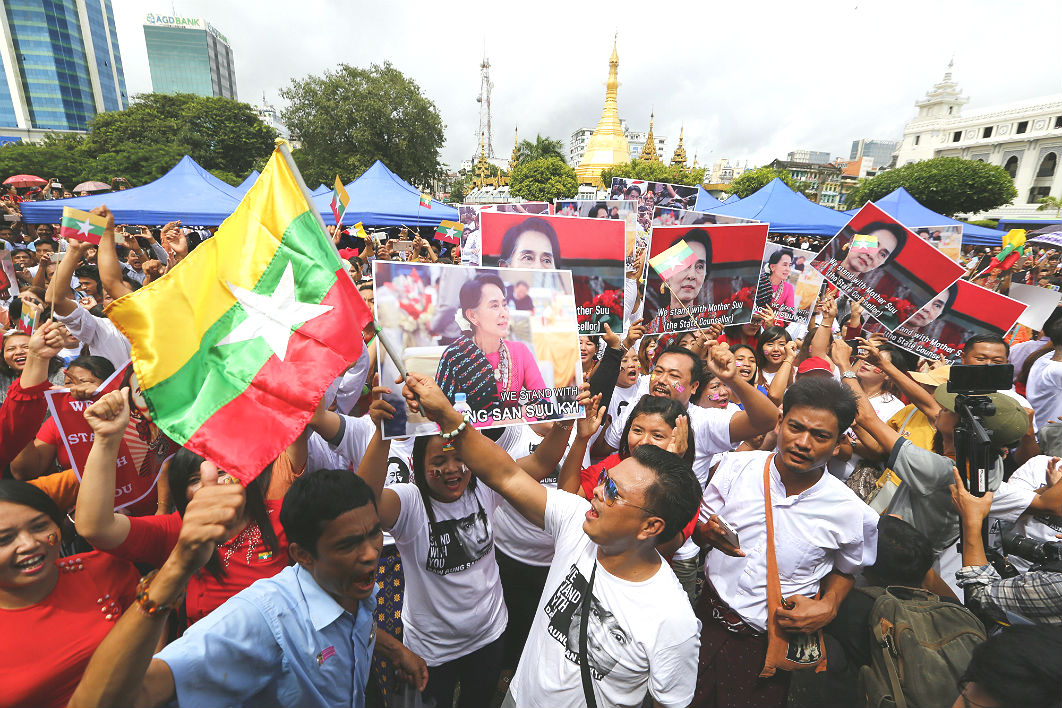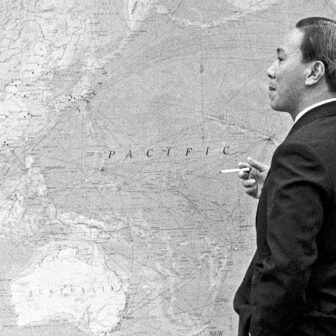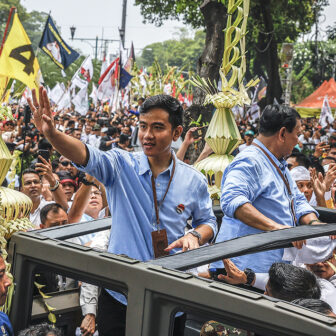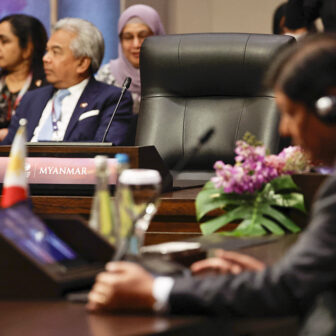For someone with a reputation for soaring rhetoric, Aung San Suu Kyi’s briefing this week on the crisis in western Myanmar’s Rakhine State was unusually workmanlike, even a little stilted.
The stakes were high. Some had called it the most important speech of her political career. The government had promised she would break her silence and explain to the world what was really happening in Rakhine State, from where an estimated 420,000 Muslim Rohingya have fled for the safety of Bangladesh.
In the end, though, the Nobel laureate offered neither a resounding defence of her government’s actions nor a stirring pledge to uphold the values she espoused for so long in opposition.
Essentially, she tried to occupy the safe middle ground of one of the country’s most fraught issues. She framed the conflict as just one of many challenges that Myanmar is facing. More time was needed, she said, noting that her government had not yet been in office for eighteen months.
For Aung San Suu Kyi the politician, this was a sensible line to take. The polarisation is such that she can’t please both international and domestic audiences at once. For the most part, she was forced to sacrifice her international appeal on the altar of domestic politics.
Political realities at home largely explain her handling of Rakhine. While the 19 September speech has generated negative media coverage internationally — headlines like “Aung San Suu Kyi, a Much-Changed Icon, Evades Rohingya Accusations” in the New York Times — the response here has been overwhelmingly positive.
In downtown Yangon, thousands turned out to watch the speech on a giant screen. A Burmese colleague who was behind the wheel when Aung San Suu Kyi came on the radio said that other drivers pulled over to the side of the road, apparently to listen. Millions are likely to have watched on state media, and all the major news outlets broadcast the speech on Facebook Live. In a literal way, it was a moment that stopped the nation.
This is not surprising. In the wake of 25 August attacks on police and military posts by the Arakan Rohingya Salvation Army, anti-Rohingya sentiment has brought Myanmar together like no other issue in recent memory. Democracy and human rights activists, ethnic and religious minorities — even non-Rohingya Muslims — have fallen in behind the government and unequivocally backed the military’s brutal response.
This sentiment is not new. But the ferocity has intensified to frankly frightening levels. The government’s declaration of ARSA as a terrorist group has opened the floodgates. Those fleeing — women and children included — are now routinely being labelled terrorist collaborators, with government officials fanning the flames. All Rohingya are to be punished for the sins of ARSA. “If people are innocent, innocent villagers, they have no reason to flee away from their villages,” the Myanmar ambassador to the United States, Aung Lynn, told Voice of America on 14 September.
It’s not surprising, then, that the flight of the Rohingya is widely seen as the solution to a problem, rather than the creation of one.
This anger and hostility is dangerous for Aung San Suu Kyi and her National League for Democracy, and their political opponents sense it. Nine days before the speech, the military-backed Union Solidarity and Development Party, which won the 2010 election after the NLD boycotted, held a forum on the crisis. Speakers took aim at the government’s strategy, particularly its decision in August 2016 to appoint a commission led by former UN secretary-general Kofi Annan to examine the causes of the conflict and recommend solutions. That commission released its final report just hours before ARSA launched its attacks.
Despite this setback, the government has pledged to implement the report’s recommendations. But this is where the military and government diverge. While they’re in lockstep on the security response in Rakhine — to the dismay of many international observers — potential conflict looms over the long-term steps to resolve the crisis. The military and the Union Solidarity and Development Party object especially to the Annan report’s recommendation that the discriminatory 1982 Citizenship Law be brought into line with international standards. They are seeking to fashion a coalition of like-minded allies and to paint the NLD as soft on the protection of ethnic and national identity. In recent weeks, the military commander-in-chief, senior general Min Aung Hlaing, has repeatedly highlighted the importance of the citizenship law in his public speeches. At a ceremony to in northern Rakhine State on 20 September to honour the soldiers who fought off an ARSA attack on a regimental headquarters, he repeated the immigration ministry motto, “Race cannot be swallowed by the ground but only by another race.”
The real game here is the 2020 election. It’s only with the benefit of hindsight that the NLD’s landslide victory in 2015 seemed inevitable. Prior to the vote, most expected Aung San Suu Kyi would have to build some sort of a coalition with ethnic parties to secure the presidency for her party.
The problem for the NLD is that the military holds 25 per cent of seats in parliament. If its proxies can scrounge one-third of the remaining, elected seats, for 50 per cent overall, they can ensure the military’s presidential nominee gets over the line. The popular support that the NLD enjoyed two years ago was never likely to be repeated, particularly in ethnic minority areas, and there will inevitably be a drop in support. It wouldn’t take much to move the needle that bit further, and hand control to the military.
The NLD will face another potential hurdle, too: repatriation of those who have fled. Aung San Suu Kyi said her government was ready to “start the verification process at any time” based on principles agreed with Bangladesh in 1993, after a similar exodus two years earlier.
Repatriation will not be as simple as Aung San Suu Kyi suggested. Most Rohingya are stateless; providing proof of citizenship will be impossible. Yet the only effective way for the government to combat allegations of ethnic cleansing will be to accept back those who have left, allow them to return to their villages and assist them to rebuild. This will be a huge challenge — and is likely to face significant opposition.
The NLD government does not have the coercive powers that the military regime enjoyed in the mid 1990s, when it repatriated an estimated 230,000 Rohingya. Instead, they will be returning to a highly charged environment. In an indication of the present tensions, on 21 September a 300-strong mob pelted a boat carrying Red Cross aid with rocks and Molotov cocktails because they believed it was destined for Rohingya communities. The shipment was only allowed to leave after the intervention of locals monks and police, who fired into the air.
For all the realpolitik at play on Rakhine, Aung San Suu Kyi’s speech was still deeply discomfiting. Delivered in English to diplomats, it was less an explanation of events in Rakhine than a lecture on how the world had failed to grasp the complexity of both this specific crisis and the country more generally. At times the NLD leader hit the right notes, including a request for international assistance to resolve the conflict, and promises to begin repatriation and citizenship verification.
But she also made a worrying number of questionable or simply incorrect claims — that all people in Rakhine State have equal access to education and health, for example, or that the violence essentially ended on 5 September. These left many scratching their heads.
Perhaps the most bizarre moment came when Aung San Suu Kyi said, “We want to find out why this exodus is happening.” Surely the answer is self-evident: their villages are gone, burned to the ground. The government’s claim that such destruction was entirely self-inflicted — that hundreds of thousands of Rohingya have destroyed their own homes before fleeing, to tarnish the military’s image or gain international sympathy and aid — is simply implausible.
Is this just spin, or does she actually believe what she is saying?
Many have suggested Aung San Suu Kyi may be fearful of defying the military, of even suggesting a version of events that implicates Myanmar’s most powerful institution in violence targeting the Rohingya. Her tone suggested neither fear nor acquiescence, just resigned frustration and an icy coolness. There was no sense of urgency, despite the humanitarian crisis unfolding along the country’s border with Bangladesh. What seemed to be lacking most of all, though, was compassion. ●




